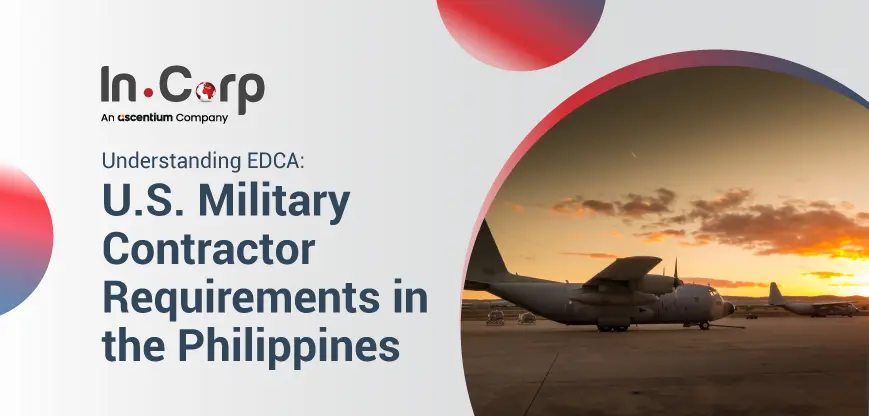
Understanding EDCA: U.S. Military Contractor Requirements in the Philippines
The Enhanced Defense Cooperation Agreement (EDCA) strengthens PH-US defense cooperation by enabling U.S. forces to operate in designated Philippine military bases. U.S. military contractors play a critical role in supporting EDCA projects, including construction, logistics, and equipment prepositioning. To operate in the Philippines through their Philippine Entity, these contractors must establish a legally registered entity in compliance with local regulations.
Key Business Considerations for U.S. Military Contractors
1. Business Registration & Legal Compliance
U.S. contractors seeking to operate in the Philippines through their intended Philippine Entity must:
- Register a Philippine entity (e.g., domestic corporation or branch office) with the Securities and Exchange Commission (SEC).
- Obtain permits and licenses from relevant government agencies, including the Bureau of Internal Revenue (BIR) and local government units (LGUs).
- Comply with Philippine labor, tax, and foreign investment laws.
2. Definition & Role of U.S. Contractors
U.S. Contractors include companies and personnel contracted by the U.S. Department of Defense (DoD) to provide support services. They are distinct from U.S. military personnel under the Visiting Forces Agreement (VFA) and EDCA.
3. Authorized Activities at EDCA Sites
The Philippine government permits U.S. Forces and U.S. Contractors to conduct:
- Training, logistics, and operational support.
- Construction, maintenance, and infrastructure development.
- Storage and management of defense equipment and humanitarian aid supplies.
4. Construction & Operational Control
- U.S. Forces oversee construction and improvements at EDCA sites, with prior consultation and approval from the Philippine government.
- The Philippines retains ownership of all permanent infrastructure built under EDCA.
5. Prepositioning & Logistics Support
- U.S. Forces may preposition and store defense equipment, supplies, and humanitarian assets in EDCA sites.
- U.S. Contractors have access for delivery, maintenance, and management of stored equipment.
6. Cost Responsibility & Property Ownership
- U.S. Forces cover proportionate costs of construction, operation, and maintenance.
- U.S. retains ownership of imported equipment, materiel, and moveable property.
7. Procurement & Local Supplier Engagement
- U.S. Forces may directly contract for goods and services within the Philippines.
- Preference should be given to Philippine suppliers, when practicable, in accordance with U.S. procurement laws.
Compliance & Strategic Advantage
Navigating EDCA’s regulatory framework requires a thorough understanding of business registration, contracting processes, and legal compliance. Establishing a Philippine entity ensures smooth operations and enhances opportunities for U.S. military contractors, contributing to stronger PH-US defense cooperation.
Allow Us to Help You Establish Your Presence in the Philippines Under the EDCA
Frequently Asked Questions
What is the Enhanced Defense Cooperation Agreement (EDCA)?
The EDCA is an agreement between the United States and the Philippines that strengthens their defense cooperation. It allows for increased U.S. military presence and activities in specific locations within the Philippines to enhance security and mutual defense.
Are U.S. Contractors required to comply with U.S. laws and regulations while operating in the Philippines?
Yes, U.S. Contractors must carry out their activities in accordance with applicable U.S. laws, regulations, and policies, as agreed upon by both parties under the EDCA.
Who are considered U.S. Contractors under the EDCA?
U.S. Contractors include companies and their employees working on contracts or subcontracts for the U.S. Department of Defense (DoD). They are distinct from U.S. personnel as defined in the EDCA and the Visiting Forces Agreement (VFA).


